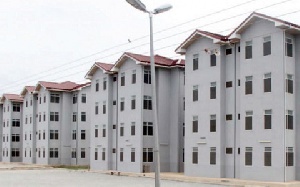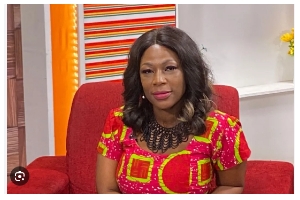Business News of Saturday, 3 November 2018
Source: thebftonline.com
The dying ‘affordable housing’ dream
"When I was looking for a two-bedroom apartment, the least price I got was GH¢600 per month, at Gbawe, a suburb of Accra. Most prices quoted were between GH¢700 and GH¢800. Some even quoted GH¢1,000, and all come with two-year advance down payment,” 28-year old Kwame Osei told the B&FT.
What it means is that, for Kwame Osei to be able to rent a decent apartment in Accra, he needs not less than GH¢14,400 (approximately US$2,880).
Such is the situation for most young men and women who want to settle down in Accra. The housing challenges are real, and it is as if all hope is lost for the affordable housing dream.
The Ghana Real Estate Developers Association (GREDA) estimates that about 50 percent of Ghanaians live in sub-standard housing and various unsuitable structures.
The statistics confirm the rather worsening housing situation in the country. The real estate sector has largely seen contracted growth in the last few years. From January 2014 to June 2018, the sector has seen a negative growth rate for 12 quarters out of the 18 quarters between these years, figures from the Ghana Statistical Service (GSS) show.
The most impressive growth the sector recorded between these years was 39.8 percent in quarter one of 2015. From there it took a sharp nosedive and plunged into the negatives in the subsequent quarters, recording -6.9, -8.7, and -6.5 percent respectively in the last three quarters of that year.
The negative trend continued in 2016 as it recorded year-on-year -2.5 and -18.5 percent in the first and second quarters respectively. However, growth jumped to 19.4 and 19.9 percent in third and fourth quarters respectively.
In 2017, growth disappointingly plunged into the negatives again, coming in at -9.7 percent in the first quarter. Nevertheless, it came back on track and hit 27.4 and 18.9 percent in the second and third quarters respectively, but returned to its negative state in the fourth quarter when it dropped to -15.8 percent.
So far, this year, the sector has not seen any positive growth. It recorded -2.7 percent in quarter one and -0.8 percent in the second quarter.
Since 2013, the period the economic rebasing took effect, its contribution has never hit 2 percent. The best is 1.9 percent which was in 2017. It was 1 percent in 2013; 0.9 percent in 2014; 1.3 percent in 2015, and 1.7 percent in 2016.
The figures from the GSS clearly show that the real estate sector is in distress and not living up to its objective of bridging the housing deficit.
In fact, most of the houses that are put up by real estate companies tend to be out of the means of working-class people. It has become a market for the rich and affluent in society alone.
The challenges
Most players of the sector have cited the high cost of land, building materials, and taxes as the main reasons the prices of real estate have remained high.
The average cost of land in Accra continues to rise. Plots of land at the fringes of the city now sell for between GH?12,000 and GH?55,000. For instance, a plot of land at Oyarifa is now selling for GH?55,000; Pokuase, GH?27,000; and Dodowa, GH?12,000.
These prices, together with the taxes and high cost of building materials, feed into the overall cost of constructing a decent accommodation in the country, making it impossible for the majority of hard-working citizens whose salaries are under GH?3,000 per month to qualify for a mortgage to buy a home.
Home prices for 2017, following the increasing pattern in land sales, remain elevated. Datya from a real estate firm, meQasa, show that in Accra a one-bedroom house now sells averagely for GH?450,000; two-bedroom – GH?358,000; three-bedroom – GH?743,000; and a four-bedroom house is sold for GH?2.3million, prices working class people can only dream about.
Government action needed
In a bid to attract more real estate developers into the affordable housing space, government has said materials imported for that purpose shall attract no taxes, whilst it also plans to make land banks available in that regard.
“When you bring in material to roll out affordable housing, one of the things we have agreed upon is to make it tax exempt because we want to encourage a particular industry like construction, Minister for Works and Housing, Samuel Atta Akyea, announced last week.
Mr. Atta-Akyea, a Member of Parliament (MP) himself, added that MPs in all 275 constituencies are hell-bent on releasing lands for the construction of affordable housing across the country.
Until these and other urgently needed measures are rolled out, though, renting a decent place of abode or owning one will continue to be a major headache for most Ghanaians.













